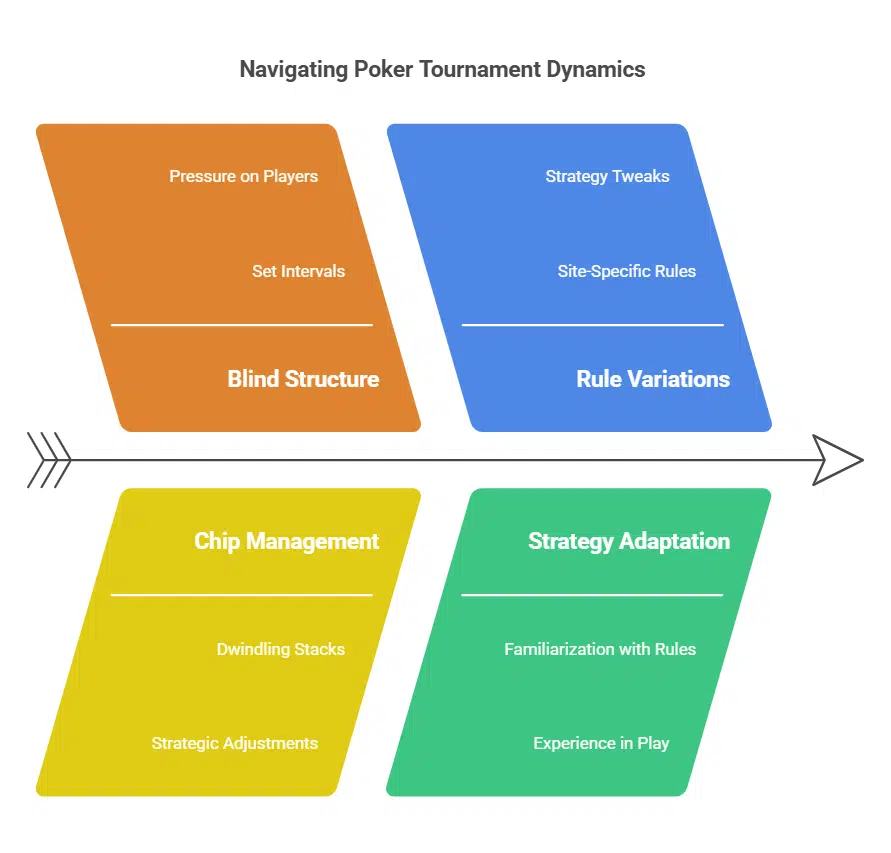Poker legend Mike Sexton once famously said that the game takes ‘five minutes to learn but a lifetime to master’ and he was bang on the money.
Tournament play at an online casino can be particularly tricky to get to grips with given that strategies keep evolving as new players take up the game.
With that in mind, read on as we provide you with a beginner’s guide to playing in online Texas Hold’em poker tournaments.
Introducing Texas Hold’em Poker Tournaments
Each player in a tournament pays a buy-in and receives a set number of chips in return. The collective buy-ins make up the prize pool, which is distributed based on finishing positions.
A single-table tournament begins when all the seats at the table are filled. If there are six seats, the players finishing first and second generally receive a payout.
Multi-table tournaments can have hundreds of players spread across numerous tables. They are whittled down until there is a final table.
To win the tournament, a player must acquire all the chips in play. Around 10-20 percent of the field usually makes the money, with winner taking home the highest amount.
The winning prize can be massive in high-stakes events. The top finishers claim the lion’s share, but even the more modest cash prizes are more than the buy-in.
Understanding Tournament Dynamics & Navigating the Rules
One of the crucial differences between poker cash games and tournaments is the rising blind levels.
The mandatory bets made by two players before each hand increase at set intervals. As the blinds increase, players with dwindling chip stacks are placed under more pressure.
Most tournament rules are the same across different sites, but subtle changes may require you to tweak your strategy. Players must familiarise themselves with the rules before the game starts.
It also pays to understand the plethora of terminology associated with poker. Here are some of the most common terms worth knowing:
- Entrance Fee: A small percentage of the buy-in usually goes to the casino.
- Seat Assignments: Players are handed a random seat.
- Starting Stacks: Every player receives the same starting stack of chips.
- Blind Levels: The blind structure dictates the pace of the game.
- Dealing: The deal is the same as in cash games, where the button (the dealer) moves clockwise after every hand.
- Bet: Any money wagered during the play of a poker hand.
- Call: To match a bet.
- Check: Pass the round of betting to the next player.
- Raise: Increase the size of an existing bet during a betting round.
- All-in Bets: When players bet all their remaining chips.
- Absent Players: Absent players must be dealt in, with their blinds forced into the pot.
- Breaking Tables: When players are eliminated, the tables break and the remaining players are reshuffled to ensure an even split.
- The Clock: Each game will have a time limit for players to make a decision. If they run out of time, their cards are folded.
- Multiple Busts: When multiple players are eliminated simultaneously, the one with the bigger starting stack finishes higher.
- Hand-for-Hand Play: As players near the bubble money, the play may go hand-for-hand to ensure fair competition.
- Heads-up Play: The final two players face each other in heads-up play, and the small blind is the first to act pre-flop.
Texas Hold’em Poker Tournaments – The Final Word
Understanding the basics of the game can take you far in the tournaments. You must familiarise yourself with the rules and fine-tune your strategy.
While poker is a game of skill, luck play its part. Having a well-thought-out plan and a thorough understanding of the game will improve your chances of winning.






































